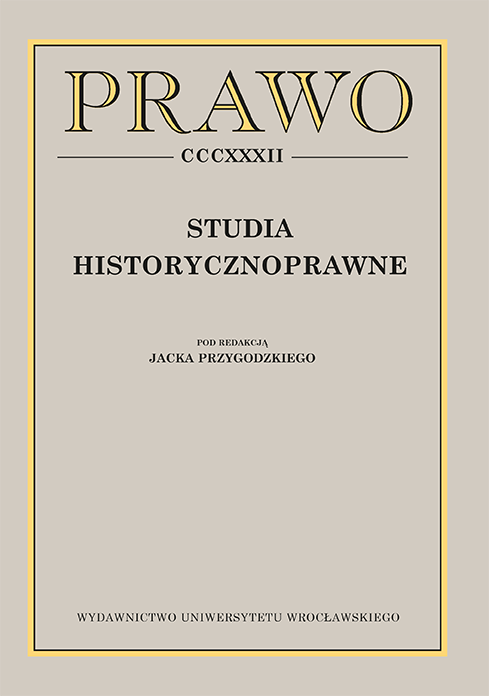

Artykuły

Władysława Andrychiewicza poglądy na ochronę firmy handlowej
Najwybitniejszym prawnikiem zajmującym się badaniem zagadnień dotyczących ochrony firmy w Królestwie Polskim (1815–1915) był Władysław Andrychiewicz. W swoich poglądach na temat firmy jednoznacznie sprzeciwiał się popularnej ówcześnie tezie, że jest ona prostą nazwą przedsiębiorstwa. Uczony konsekwentnie bowiem starał się bronić twierdzenia, że firma jest nazwą specjalną, którą handlujący (osoba czy spółka) oznacza swoje istnienie w obrocie i całą swoją działalność handlową. Firma stanowiła więc odzwierciedlenie osoby kupca nie jako człowieka (do tego służyło nazwisko), ale jako handlującego. Nadto uczony dokładnie tłumaczył, jak rozumie i na czym w praktyce polega prowadzenie handlu pod firmą danego kupca. Andrychiewicz był zwolennikiem zasady bezwzględnej prawdziwości firmy, która polegała na bezwarunkowej jej zgodności z nazwiskiem przedsiębiorcy prowadzącym przedsiębiorstwo. Badacz ten, podobnie jak przeważająca część ówczesnej doktryny francuskiej, sprzeciwiał się praktyce umieszczania w firmie nazwisk osób, które w rzeczywistości nie brały udziału w działalności przedsiębiorstwa, a jedynym ich wkładem było udzielenie zgody na używanie nazwiska. Działanie takie miało być sprzeczne z prawem, moralnością oraz z istotą firmy. Zdaniem Andrychiewicza firma stanowiła pewnego rodzaju dobro prawne ściśle związane z bytem i działalnością kupca, co czyniło ją znakiem (prawem) czysto osobistym. Decydowało to o niezbywalnym jej charakterze. Stąd też uczony był zdecydowanym przeciwnikiem dopuszczalności zbywania firmy, zarówno bez przedsiębiorstwa, jak i razem z nim. Swoją wiedzę teoretyczną próbował przenieść na grunt praktyki. Pracował bowiem na rzecz zmiany przepisów dotyczących ochrony firmy obowiązujących w Królestwie Polskim. W konsekwencji jednak jego wysiłki okazały się bezskuteczne.
Władysław Andrychiewicz’s views on the protection of the business name
The most prominent lawyer involved in research on issues related to the protection of the business name within the Kingdom of Poland (1815–1915) was Władysław Andrychiewicz. In his views on the business name, Andrychiewicz clearly opposed the popular thesis at that time that the business name is a simple name of the enterprise. The scholar consistently tried to defend the thesis that the business name is a specific name, with which the entrepreneur (an individual, a partnership or a company) marks their existence on the market and all their commercial activity. Therefore the business name constituted a reflection of the merchant not as a person (a surname served this purpose), but as a trader. Moreover, the scholar has clearly explained how he understands and what it means to conduct the business under the specific merchant’s business name. Andrychiewicz was an advocate of the principle of the veracity of the business name, which consisted in unconditional compliance of the business name with the name of the entrepreneur running its business. This researcher, as well as the majority of the contemporary French doctrine opposed the practice of including in the business names the surnames of persons who in fact did not take part in the business activity, and whose only contribution was consenting to the use of their names. Such an action was considered to be contrary to law, morality, and the essence of the business name. According to Andrychiewicz, the business name was a certain type of legal good closely related to the existence and activity of the merchant, which made it a purely personal mark (right). It determined the inalienable nature of the business name. Therefore, the scholar was a strong opponent of the admissibility of selling the business name, both without the enterprise as well as together with the enterprise. The scholar has tried to implement his theoretical knowledge into the field of practice. He worked for the benefit of the amendments to regulations regarding the protection of the business name in force in the Kingdom of Poland. As a result, however, his efforts have been unsuccessful.
Die Ansichten von Władysław Andrychiewicz betreffend den Schutz des Geschäftsnamens
Der prominenteste Jurist, der sich im Königreich Polen (1815–1915) mit den Forschungen betreffend den Schutz des Geschäftsnamens beschäftigte, war Władysław Andrychiewicz. In seinen Ansichten über die Firmenbezeichnung widersprach er eindeutig der damals gängigen These, dass die Firma eine einfache Bezeichnung eines Unternehmens ist. Der Wissenschaftler bemühte sich konsequent, die Behauptung zu verteidigen, dass die Firma ein Sondername ist, mit dem sowohl der Händler als auch das Handelsunternehmen sein Bestehen im Verkehr und seine ganze Handelstätigkeit bezeichnet. Die Firma stelle also keine Widerspiegelung der Person eines Kaufmanns als eines Menschen (dazu diente sein Name) dar, sondern als eines Händlers. Darüber hinaus erklärte der Forscher genau, wie er das versteht und worauf es in der Praxis beruht, den Handel unter der Firma eines gegebenen Kaufmannes zu führen. Andrychiewicz war ein Befürworter des Grundsatzes der absoluten Firmenwahrheit, der darauf beruhte, dass die Firma mit dem Namen des sein Unternehmen führenden Kaufmannes unbedingt zu übereinstimmen hatte. Der Forscher, ähnlich wie die Mehrheit der französischen Doktrin, war gegen die Praxis, in den Geschäftsnamen die Namen der Personen aufzunehmen, die in Wirklichkeit an der Tätigkeit des Unternehmens nicht beteiligtet waren und deren einzige Beteiligung darin bestand, dass sie der Verwendung ihrer Namen zustimmten. Derartige Handlung sei rechtswidrig und sittenwidrig, und solle gegen das Wesen der Firma verstoßen. Nach Meinung von Andrychiewicz stellte die Firma ein gewisses strikt mit der Existenz und Tätigkeit des Kaufmanns verbundenes Rechtsgut dar, was sie zu einem rein persönlichen Zeichen (Recht) machte. Das entschied über die Unveräußerlichkeit der Firma. Daher war der Forscher entschieden gegen die Zulässigkeit der Veräußerung der Firma, sowohl ohne das Unternehmen als auch mit dem Unternehmen. Er versuchte, sein theoretisches Wissen in die Praxis umzusetzen, er arbeitete nämlich an der Änderung der Vorschriften betreffend den Schutz der Firma, die im Königreich Polen galten. Letztendlich erwiesen sich seine Bemühungen jedoch als erfolglos.